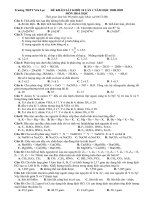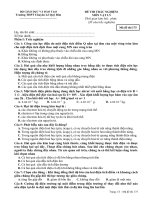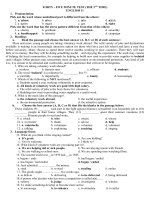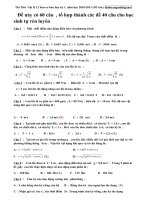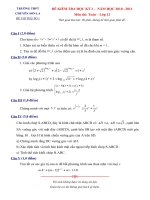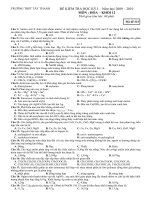DE THI THU HOC KY 1 - KHOI 11
Bạn đang xem bản rút gọn của tài liệu. Xem và tải ngay bản đầy đủ của tài liệu tại đây (82.64 KB, 2 trang )
FORTY - FIVE MINUTE TEST (THE 2
ND
TIME)
ENGLISH 11
1. Pronunciation:
Pick out the word whose underlined part is different from the others:
1. a. whose b. when c. why d. which
2. a. tution b. music c. use d. ruler
Pick out the word that has the stress pattern different from that of the others:
3. a. charity b. gratitude c. donation d. smoothly
4. a. handicapped b. minority c. remote d. campaign
2. Reading:
a. Read the passage and choose the best answer (A, B, C or D) of each sentence:
More and more young people are taking voluntary work abroad. The wild variety of jobs and destinations
available is making it an increasingly attractive option for those who have just left school and have a year free
before university. Many choose to spend these twelve months working in poor countries. There they will earn little
or no money. But they will be doing something useful – and enjoying the experience. The work may consist of
helping the local communities, for example by helping to build new road or provide water supplies to isolated rural
villages. Other projects may concentrate more on conservation or environmental protection. Any kind of job it is, it
is certain to be attracted and worthwhile, and an experience that will never be forgotten.
5. Who are taking voluntary work abroad?
a. workers b. famous stars c. officers d. students
6. The word “isolated” is a reference to __________line 5?.
a. carefully b. importantly c. lonely d. increasingly
7. Which of the following is NOT mentioned?.
a. Students spend a year working voluntarily in poor countries.
b. All kinds of voluntary work are paid with high salary.
c. The wild variety of jobs is the best choice for volunteers.
d. Building new road or providing water supplies is a useful work.
8. What is the main idea of this passage?.
a. the voluntary work abroad. b. the useful experience.
c. the environmental protection. d. the attractive option.
b. Choose the best answer (A, B, C or D) that fits the blanks in the passage below:
Those students (9) ________ took part in the fight against illiteracy considered it an honorable job to (10)
________ people in their home villages. They (11) ___________ spent their summer vacations (12)
________ illiterate people to read and write.
9. a. which b. who c. whom d. whose
10. a. overcome b. thank c. advise d. help
11. a. voluntarily b. volunteers c. voluntary d. volunteer
12. a. talking b. explaining c. teaching d. singing
3. Language focus:
13. What do you think of the singing contest?
a. It’s great. b. Are you kidding?
c. You’re welcome. c. I think so !
14. What kind of volunteer work are you taking part in?.
a. We are helping old or sick people. b. We are playing tennis with friends.
c. We are walking to school now. d. We are spending time watching films.
15. The second world war in 1939 and in 1945.
a. begins / ends b. had begun / ended
c. has begun / had ended d. began / ended
16. Jack admitted ....................... the money.
a. steal b. to steal c. stealing d. stolen
17. The goods ought ....................... two weeks ago.
a. to deliver b. delivering c. to be delivered d. being delivered
18.A person who decides who has won a competition is called a(n)........
a. referee b. judge c. investigator d. witness
19. To make something develop or become more active.
a. to encourage b. to enhance c. to stimulate d. to strike
20. They had a really good chance of winning the national ......................
a. compete b. competition c. competitor d. competitive
21. The programmes of “Universalisation of Primary ________” had completed by July 2000.
a. education b. educational c. educate d. educated
22. “Don’t forget to ring me”
a. I advised David to ring me c. I reminded David to ring me
b. I offered to be rung d. You promised to ring me
23. .” You have stolen my best cassette, Bob!” said Willy
a. Willy accused Bob for having stolen his best cassette.
b. Willy accused Bob of having stolen his best cassette.
c. Willy accused Bob on having stolen his best cassette.
d. Willy accused Bob to have stolen his best cassette.
24. “I didn’t copy her lesson”.
a. Peter suggested copying her lesson the previous day.
b. Peter thought of copying her lesson the previous day.
c. Peter dreamt of copying her lesson the previous day.
d. Peter denied copying her lesson the previous day.
25. The old man fell down the upstair. He was in the hospital.
a. Falling down the upstair, the old man was in the hospital.
b. Falling down the upstair, he was in the hospital.
c. Having fell down the upstair, he was in the hospital.
d. Having fell down the upstair, the old man was in the hospital.
26. I Casablanca for the first time last night. I it before.
a. saw / had never seen b. have seen / had never seen
c. see / have never seen d. was seeing / has never seen
27. when the party was , we helped them clear up the room.
a. up b. off c. out d. over
28. John moved away three weeks _ .
a. since b. ago c. before d. over
Error recognition:
Choose the underlined part among A, B, C or D that needs correcting:
29. I didn’t met you since you moved to Dalas.
A B C D
30. Tom invited Mary come and have breakfast with him then.
A B C D
31. While listened to music on cell phone, Tom walked to school.
A B C D
32. I am watching the television programme “Sao Mai Television Singing Show” at the moment.
A B C D
4. Writing:
A. Change into Reported Speech:
1. “Do you want to take a rest in Fresh Water Lake now?, Mai said to Yen. (invite)
Mai .................................................................................................................................................
2. “I hear you got a scholarship last week. Congratulation!”, my mother said to me (congratulate)
My mother .......................................................................................................................................
B. Rewrite the statements by using “Verb + O + Vo” or “Having + V
3
ed :
3. After the boss had entered the meeting room, he asked me to give him a check list. (having + V
3
ed)
After.................................................................................................................................................
4. My mother asked me to give up drinking wine at night. (verb + O + Vo)
My mother let ...................................................................................................................................
• Key :
1. Mai invited Yen to take a rest in Fresh Water Lake then.
2. My mother congratulated me on getting a scholarship the following week.
3. After having entered the meeting room, the boss asked me to give him a check list.
4. My mother let me give up drinking wine at night.
THE END

